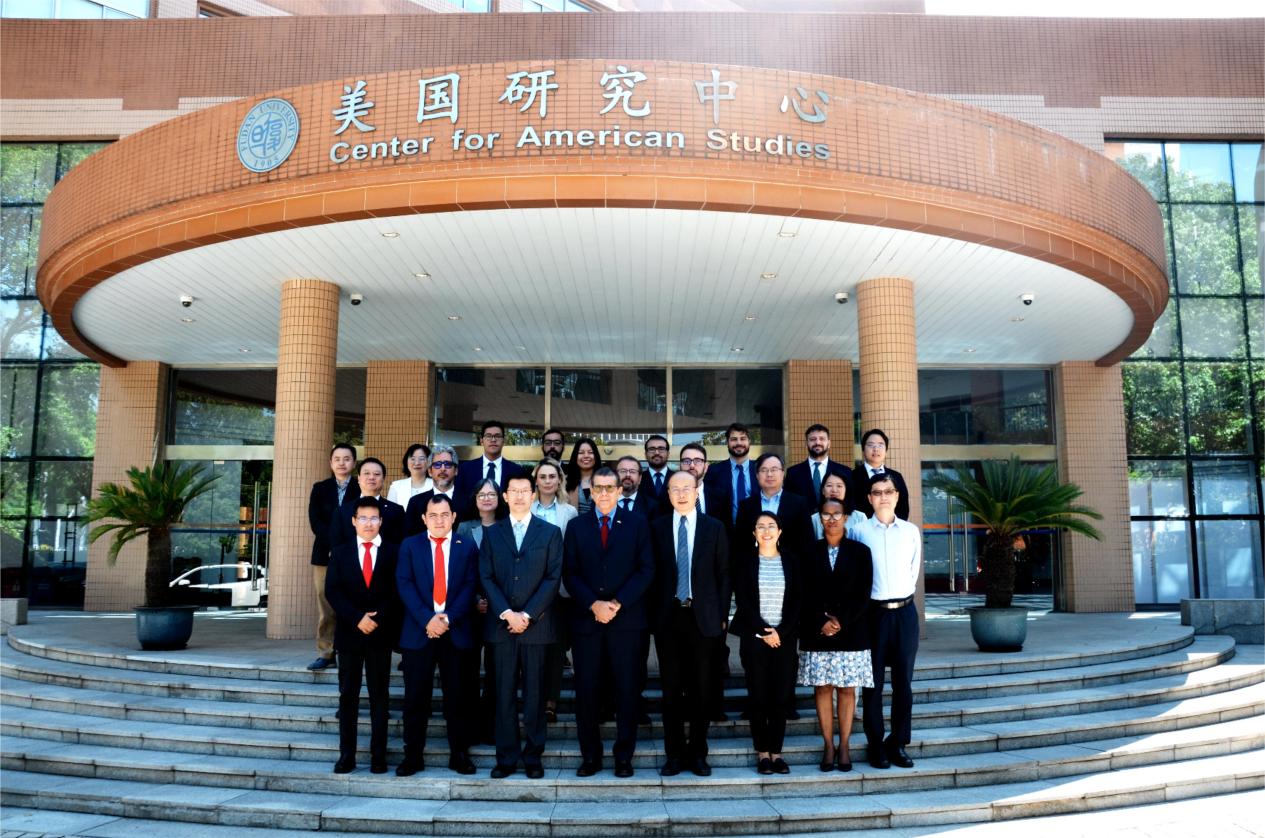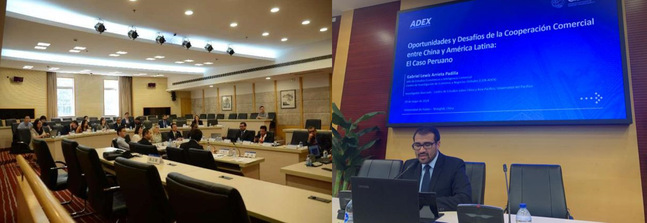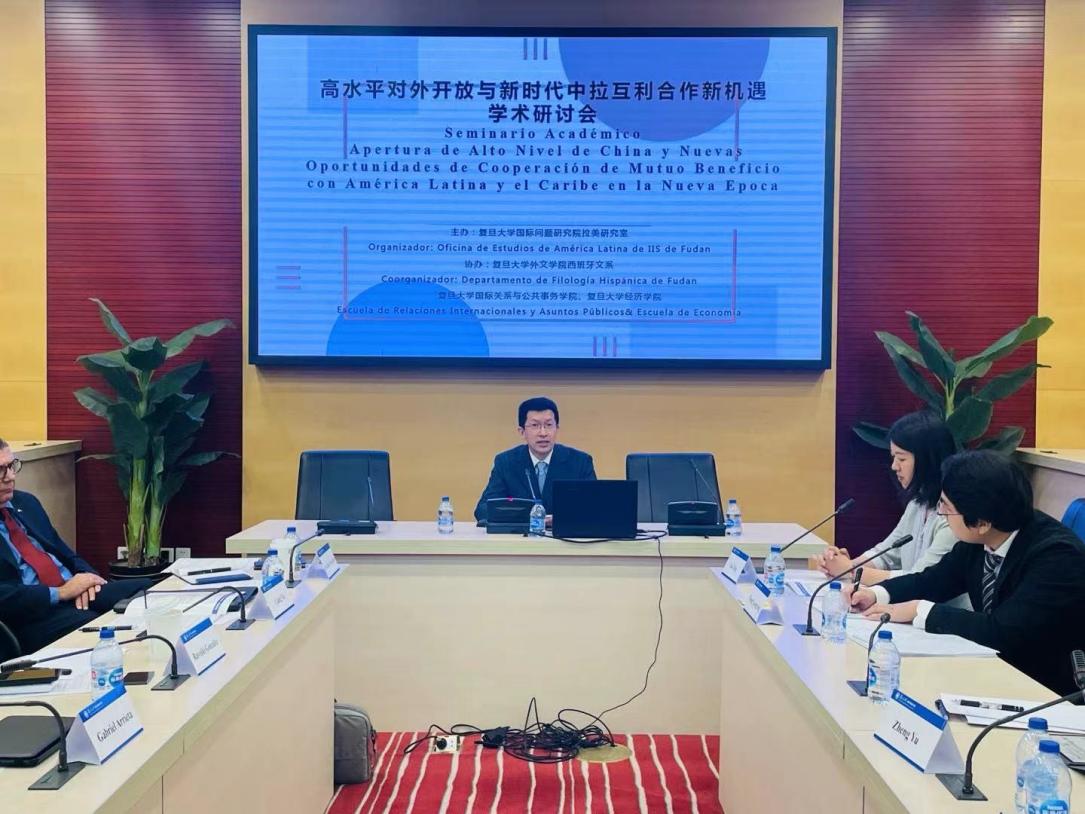On May 29, 2024, the Research Office for Latin American Studies at the Institute of International Studies at Fudan University (ROLAS Fudan) hosted a delegation of young scholars from Latin American leading think tanks and Ambassador Liang Yu from the Chinese Ministry of Foreign Affairs. During the visit, ROLAS Fudan also organized an international symposium on New Opportunities for High-End Opening-up and China-Latin America Mutually Beneficial Cooperation in the New Era. Vice President of Fudan University, Prof. Chen Zhimin, attended the reception and delivered a speech. He welcomed Ambassador Liang Yu and the Latin American scholars' delegation, introduced the development of Fudan University's think tanks, ROLAS, and the Fudan-Latin America University Consortium, and extended an invitation to more young scholars and students from Latin American countries to visit and study at Fudan. The delegation leader, former Cuban Deputy Foreign Minister Ambassador Cabañas, expressed his appreciation and pleasure to visit Fudan University. He looked forward to strengthening exchanges with Chinese scholars to contribute to promoting China-Latin America relations. The symposium consisted of two sessions. The first session, China's Reform and Opening-up and Development Opportunities in the Context of Global Changes, featured five Chinese speakers and was chaired by the Deputy Director of Research Office for Latin American Studies at Fudan University, Assoc. Prof. Cao Ting. Prof. Song Guoyou, Deputy Director of the Center for American Studies, emphasized that high-quality development is China's contribution to the world and can become an important area of international cooperation, beneficial for stabilizing and improving international relations. Prof. Zheng Yu from the School of International Relations and Public Affairs pointed out the need for countries to focus more on poverty reduction initiatives, aligning the Global Development Initiative with the United Nations 2030 Agenda for Sustainable Development to promote sustainable development worldwide. Prof. Chen Zhao from the School of Economics highlighted the significant potential for China-Latin America economic cooperation, noting that Latin America could serve as a transit hub for China-US economic and trade exchanges. Prof. Cheng Yiyang from the Department of Spanish, College of Foreign Languages and Literatures, discussed the future deepening of China-Latin America cultural exchanges and the construction of a China-Latin America community with a shared future. Assoc. Prof. Cao Ting provided an overview and analysis of the development dynamics of Shanghai's five centers construction. The second session, Opportunities and Challenges for China-Latin America Economic and Trade Cooperation, featured three Latin American scholars and was chaired by Carmen Navas, Secretary-General of the Venezuelan Simón Bolívar Institute. Researcher Ruvieles González from the Cuban International Policy Research Center suggested that Latin American countries should formulate medium- and long-term development strategies, adjust import and export strategies based on China's dual circulation strategy, and strengthen trade in new products. Gabriel Arrieta, Director of the Global Economy and Business Research Center of the Peruvian Exporters Association, introduced the construction and development potential of Peru's Chancay Port, emphasizing the substantial potential for China-Latin America trade, with the port potentially becoming a crucial hub radiating to other Latin American countries. Orlando Lucas, President of the Santa Cruz International Affairs Expert Association in Bolivia, noted that China's investments in Latin America come without political conditions, and China and Latin America have established a mutually beneficial cooperation relationship. In concluding remarks, Ambassador Liang Yu from the Chinese Ministry of Foreign Affairs shared his experiences in Latin American countries, analyzed the vast opportunities for China-Latin America cooperation, and provided an outlook on the future of China-Latin America relations. The symposium was hosted by the ROLAS Fudan, with co-organization by the Department of Spanish, the School of Foreign Languages and Literatures, the School of International Relations and Public Affairs, and the School of Economics. The visiting delegation of young scholars from Latin American leading think tanks consisted of 16 members from countries including Cuba, Brazil, Mexico, Argentina, Chile, and Venezuela. More than twenty faculty and students from the Institute of International Studies, School of International Relations and Public Affairs, College of Foreign Languages and Literatures, School of Economics, and Fudan Institute for Advanced Study in Social Sciences at Fudan University attended the symposium.




ROLAS Fudan Hosts Delegation of Young Scholars from Latin American Leading Think Tanks
发布时间:
2024-05-31
访问次数:
247
